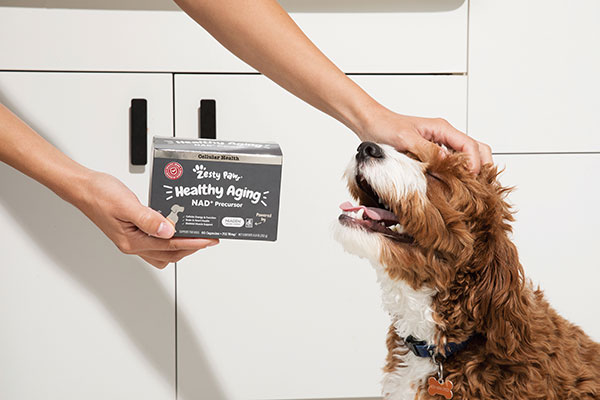While you may look at your dogs and see the same little puppies you brought home years ago, the reality is they age the same way people do, and if you count in “dog years,” sometimes even faster. The aging process for dogs can mean graying whiskers and less ball chasing, but it may also mean adjusting to changing health needs.
As dogs approach their late adult and senior years, it’s important to adapt the ways they’re cared for so they can enjoy happy and healthy lives. To fully support your dog’s lives as they age, consider this advice from the pet experts at Zesty Paws.
Enjoy Enrichment and Exercise
Whether your furry friends prefer a friendly game of fetch or a long walk around the neighborhood, exercise is key for dogs of all ages. As dogs mature, some of the high-energy bursts may fade, but continuing with low-impact exercises can help them stay in shape both physically and mentally.
Stay active by walking to support joint health and mobility and keep regular grooming appointments to support healthy skin and coat. Don’t forget enrichment activities to help stimulate their minds, too. Try hiding food or treats in puzzles or toys, or schedule play dates with other dogs so they can get active and socialize.
Explore the Benefits of Functional Pet Supplements
 Dogs, just like humans, have a molecule in their bodies called nicotinamide adenine dinucleotide (NAD+), which supports cellular function, energy and repair mechanisms. NAD+ levels naturally decline throughout the aging process, but to help negate these effects and support cellular health regeneration in dogs, Zesty Paws created a supplement to support healthy aging for dogs.
Dogs, just like humans, have a molecule in their bodies called nicotinamide adenine dinucleotide (NAD+), which supports cellular function, energy and repair mechanisms. NAD+ levels naturally decline throughout the aging process, but to help negate these effects and support cellular health regeneration in dogs, Zesty Paws created a supplement to support healthy aging for dogs.
Powered by Niagen to help reinvigorate cellular energy, the Healthy Aging NAD+ Precursor system brings a little of their puppyhood back through support of normal cellular, metabolic, brain and heart, skeletal and muscle health. This innovative system of supplementation offers pet parents a fun and unique way to support their dog’s golden years.
Adapt Your Dogs’ Diets to Match Life Stages
A healthy and balanced diet is important for dogs of all ages. With that in mind, there are subtle nuances at different life stages that call for ingredients and food blends to match dietary needs. For example, puppies typically require foods with more protein and fats to help fuel their growth.
Adult dogs may need food that is more focused on addressing issues like gut health, weight control, dental hygiene and other needs. Then, as pets mature into their senior years, you may need to consider foods with added support for their hips and joints or a lower-calorie diet to help alleviate weight concerns due to decreased activity.
Be Diligent About Regular Vet Appointments
While pet parents already know the importance of keeping up with routine veterinarian visits, these check-ins with a health professional can take on increased significance for aging pets.
It’s recommended to schedule regular appointments with your vet so he or she can conduct physical examinations to monitor your pet’s well-being, and this time also provides an opportunity for you to discuss any changes you’ve noticed in your pet’s routines. Just like you, your adult dogs should have a complete examination at least once a year.
Stick to Routines
Just as you have certain things you do each day, like brushing your teeth and making your morning coffee, dogs can also benefit from having their own routines. Whether it’s a morning walk or weekly bathing, having a routine can reinforce previous training for adult dogs and help them continue to learn new behaviors.
Routines based on exercise, enrichment, training and grooming can help ease the tension of other life changes such as travel, moving or new house guests and allow dogs to feel more confident and comfortable. For these aging pets, having and maintaining a routine can also be helpful for consistency and reducing nervousness.
To learn more ways to support your pet’s health and well-being, visit ZestyPaws.com.
Zesty Paws

